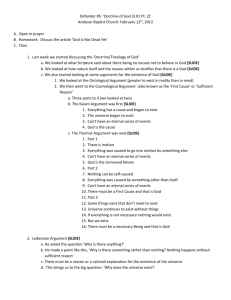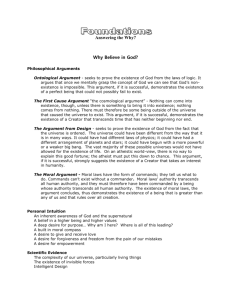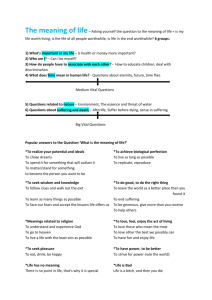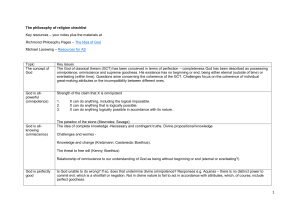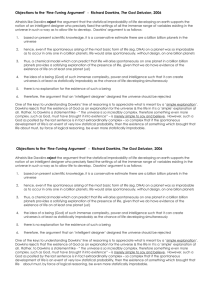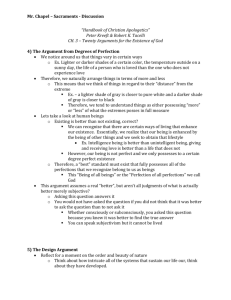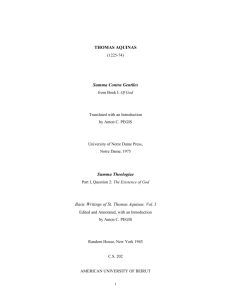God`s Existence - Back to Basics
advertisement
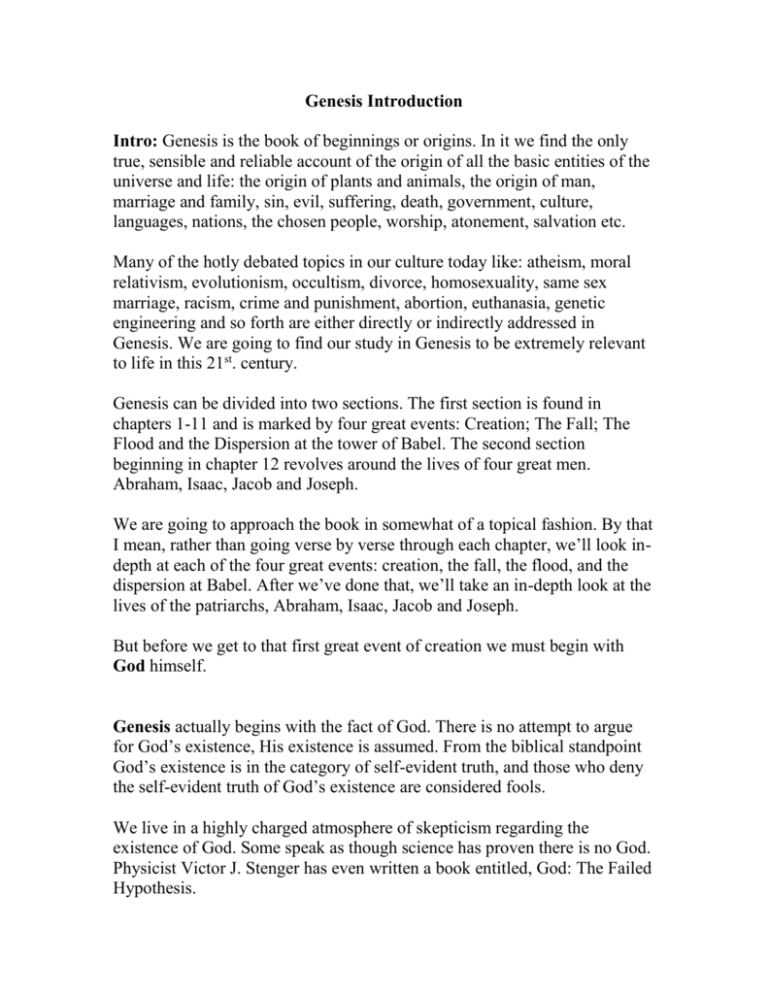
Genesis Introduction Intro: Genesis is the book of beginnings or origins. In it we find the only true, sensible and reliable account of the origin of all the basic entities of the universe and life: the origin of plants and animals, the origin of man, marriage and family, sin, evil, suffering, death, government, culture, languages, nations, the chosen people, worship, atonement, salvation etc. Many of the hotly debated topics in our culture today like: atheism, moral relativism, evolutionism, occultism, divorce, homosexuality, same sex marriage, racism, crime and punishment, abortion, euthanasia, genetic engineering and so forth are either directly or indirectly addressed in Genesis. We are going to find our study in Genesis to be extremely relevant to life in this 21st. century. Genesis can be divided into two sections. The first section is found in chapters 1-11 and is marked by four great events: Creation; The Fall; The Flood and the Dispersion at the tower of Babel. The second section beginning in chapter 12 revolves around the lives of four great men. Abraham, Isaac, Jacob and Joseph. We are going to approach the book in somewhat of a topical fashion. By that I mean, rather than going verse by verse through each chapter, we’ll look indepth at each of the four great events: creation, the fall, the flood, and the dispersion at Babel. After we’ve done that, we’ll take an in-depth look at the lives of the patriarchs, Abraham, Isaac, Jacob and Joseph. But before we get to that first great event of creation we must begin with God himself. Genesis actually begins with the fact of God. There is no attempt to argue for God’s existence, His existence is assumed. From the biblical standpoint God’s existence is in the category of self-evident truth, and those who deny the self-evident truth of God’s existence are considered fools. We live in a highly charged atmosphere of skepticism regarding the existence of God. Some speak as though science has proven there is no God. Physicist Victor J. Stenger has even written a book entitled, God: The Failed Hypothesis. Browsing the bookstores at Heathrow airport I noticed these titles in the non-fiction section. The God Delusion, God is not Great, The End of Faith. We are experiencing an onslaught of aggressive atheism here in the West. Let me give you an example of some of the rhetoric coming from the socalled new atheist: Physicist Steven Weinberg writes, “anything we scientist can do to weaken the hold of religion should be done and may in the end be our greatest contribution to civilization.” Christopher Hitchens writes, “All religions and all churches are equally demented in their belief in divine intervention, divine intercession, or even the existence of the divine in the first place.” Richard Dawkins writes, “The great unmentionable evil at the center of our culture is monotheism. From a barbaric Bronze Age text know as the Old Testament, three anti-human religions have evolved: Judaism, Christianity, and Islam.” With these kinds of vitriolic tirades becoming more and more the norm in our culture, I believe that we need to equip ourselves to respond to these types of attacks. Therefore I thought it would be good for us to take a look again at some of the arguments for the existence of God. 1. The Cosmological argument- This argument states in essence that the universe is an effect which must have had a cause. “The Law of cause and effect states that the effect cannot be greater, in size or in kind, than the cause… No exceptions to the law of cause and effect have ever been observed. It follows that every effect we see in the universe must have had a cause, and we can trace all effects back to a First Cause. The first cause of time must be greater than time, in fact eternal. The first cause of space must be greater than space, namely infinite… The first cause of all the energy in the universe cannot be less than the sum total of that energy, the first cause is omnipotent. By similar logic, we can consider all the information; not just the intrinsic properties of matter, but the genetic information in all the varied forms of animal and vegetable life and conclude that the first cause must be omniscient, all knowing”. (Dr. David Rosevere) 2. The Teleological argument- This arguments states that where there is a design there must be a designer, where there is purpose there must be one who purposed it. a. Irreducible complexity of the cell. b. The anthropic principle. 3. The Moral argument- This argument states that there must be a God to account for the universal sense of right and wrong among people. 4. The argument from Congruity- This arguments is based on the belief that the postulate which best explains the related facts is probably true. In this particular case, belief in the existence of God best explains the facts of our moral, mental and religious nature, as well as the facts of the material universe… without this postulate (God exist) these facts are really inexplicable. Each of these arguments presents (in my opinion) the logical and reasonable conclusion that must be drawn from the observable evidence. But when it comes to atheist we are not dealing with rational, reasonable people. Listen to Dawkins, “The world is divided into things that look as though somebody designed them (wings and wagon wheels, hearts and televisions), and things that just happened through the unintended workings of physics (mountains and rivers, sand dunes and solar systems). Charles Darwin discovered a way in which the unaided laws of physics- the laws according to which things “just happen” – could, in the fullness of geologic time, come to mimic deliberate design. The illusion of design is so successful that to this day most Americans (including, significantly, many influential and rich Americans) stubbornly refuse to believe it is an illusion.” In an interview with Ben Stein, Dawkins conceded that there could possibly be an intelligent designer behind creation but insisted that the designer would be an extraterrestrial rather than God as revealed in the Bible. Richard Dawkins and the New Atheist are men who are in reality intellectually dishonest. They hide behind their scientific degrees but their real reasons for denying the existence of God are moral. At the end of the day they simply do not want a God to whom they must give an account. Anthony Flew, the world’s foremost atheistic philosopher for more than fifty years recently wrote a book entitled: There is a God. Subtitled: How the worlds most notorious atheist changed his mind. “Science cannot furnish an argument for God’s existence. But… the laws of nature, life with its teleological organization, and the existence of the universe – can only be explained in the light of an Intelligence that explains both its own existence and that of the world… How, it might be asked, do I as a person respond to the discovery of an ultimate reality that is an omnipresent and omniscient Spirit? I must say again that my journey to my discovery of the Divine has thus far been a pilgrimage of reason. I have followed the argument where it has led me. And it has led me to accept the existence of a self-existent, immutable, immaterial, omnipotent, and omniscient Being. Where do I go from here? In the first place, I am entirely open to learning more about the divine reality, especially in the light of what we know about the history of nature. Second, the question of whether the Divine has revealed itself in human history remains a valid topic of discussion. You cannot limit the possibilities of omnipotence except to produce the logically impossible. Everything else is open to omnipotence. With particular reference to the Christian claim that God became man in the person of Jesus Christ, as I have said more than once, no other religion enjoys anything like the combination of a charismatic figure like Jesus and a first-class intellectual like Paul. If you’re wanting omnipotence to set up a religion, it seems to me that this is the one to beat!” Close: In the final analysis, the greatest argument for the existence of God is Jesus Christ. He is the image of the invisible God, the firstborn over all creation. For by Him all things were created that are in heaven and that are on earth, visible and invisible, whether thrones or dominions or principalities or powers. All things were created through Him and for Him. And He is before all things, and in Him all things consist.

